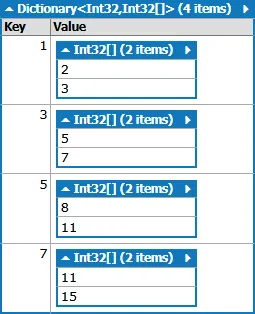我有一个 n 行 3 列的数组,希望将其转换为 Dictionary<string,string[]>,其中第一列作为键,剩下的列作为值的数组。
例如:
Key = arr[0,0], Value = new string[2] {arr[0,1], arr[0,2]}.
我知道ToDictionary,但我不知道如何设置值部分。
arr.ToDictionary(x=>arr[x,0],x=>new string[2]{arr[x,1],arr[x,2]});
//This doesn't work!!!
如何正确设置它?

arr[0][0]- 它必须是arr[0, 0]。那是哪一个? - Enigmativity